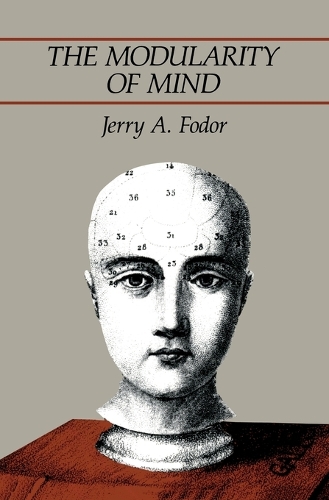
The Modularity of Mind
(Paperback)
Publishing Details
The Modularity of Mind
By (Author) Jerry A. Fodor
MIT Press Ltd
MIT Press
6th April 1983
United States
Classifications
Tertiary Education
Non Fiction
150.192
Physical Properties
Paperback
158
Width 133mm, Height 203mm, Spine 8mm
181g
Description
This study synthesizes current information from the various fields of cognitive science in support of a new and exciting theory of mind. Most psychologists study horizontal processes like memory and information flow; Fodor postulates a vertical and modular psychological organization underlying biologically coherent behaviors. This view of mental architecture is consistent with the historical tradition of faculty psychology while integrating a computational approach to mental processes. One of the most notable aspects of Fodor's work is that it articulates features not only of speculative cognitive architectures but also of current research in artificial intelligence.
Reviews
"The issue Fodor writes about is central to the psychology of perception, cognition, and action. It is the central issue for anyone who would seriously study the neurobiology of behavior: Is the mind organized horizontally or vertically or both, and what are the consequences to psychology of proceeding on one assumption or the other This has been little analyzed and written about. Jerry Fodor has repaired that omission and had done it brilliantly." Alvin Liberman, Yale University, President, Haskins Laboratories "Jerry Fodor's Modularity of Mind is a beginning... [It] is the first major monograph in this century to explore some variations on faculty psychology [and] is the best thing Fodor has done since The Language of Thought, mainly because it takes such a wide sweep and yet manages to concentrate all the arguments upon the central issue in both neuropsychology and information-processing psychology." John C. Marshall , The Radcliffe Infirmary, Oxford, "Jerry Fodor"s Modularity of Mind is a beginning... [It] is the first major monograph in this century to explore some variations on faculty psychology [and] is the best thing Fodor has done since The Language of Thought, mainly because it takes such a wide sweep and yet manages to concentrate all the arguments upon the central issue in both neuropsychology and information-processing psychology." John C. Marshall , The Radcliffe Infirmary, Oxford,
Author Bio
Jerry A. Fodor is State of New Jersey Professor of Philosophy at Rutgers University. He is the author of The Mind Doesn't Work That Way- The Scope and Limits of Computational Psychology (MIT Press) and other books.
